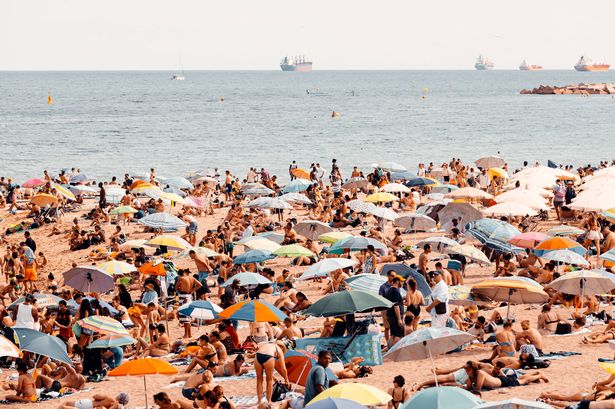Millions of Brits book holidays to Spain every year and are seen as a crucial source of income for the country but not all locals are fans of the visitors – especially those who are rowdy
Millions of Brits flock to Spain for their holidays each year, but their presence isn’t always met with open arms by the locals. From rowdy antics to overcrowding, it’s no secret that some tourists can be a nuisance, prompting the introduction of new rules to curb unruly behaviour.
It’s now emerged that Spanish locals have been using a colloquialism to refer to these pesky and it’s far from flattering. UK visitors might have overheard locals uttering the term ‘guiri’, which is pronounced ‘guee-ree’. This label is often directed at holidaymakers who revel in letting loose and enjoying a few too many drinks.
READ MORE: ‘I tried Whisker’s Litter-Robot 4 to see if it could end the daily cat litter nightmare for good’
The origins of ‘guiri’ are disputed, with some attributing it to the Basque word ‘giri’, meaning ‘blonde’ or ‘fair-skinned’. Others claim it has its roots in a Hindi term used by the Indian diaspora to describe white people.
In the context of modern-day Spain, ‘guiri’ generally refers to a white person with a paler complexion than most Spaniards.
Journalist Leah Pattem, who spends considerable time in Spain, has argued that the term carries an element of offensiveness. “A guiri is also categorised as naïve and/or ignorant, trapped in their own culture due to refusal or inability to integrate,” she noted.
“They will dress wrong, be sunburnt and generally look hot and bothered. Most Spaniards will argue that the word guiri is not offensive, but it undeniably makes sweeping assumptions about a person based on either their appearance, their nationality, or their behaviour.”
Tensions surrounding the impact of tourism have reached boiling point, with the Canary Islands being a key hotspot. Mass protests took place across Tenerife, Lanzarote, Gran Canaria, Fuerteventura and La Palma last year, echoing the rising frustrations of locals.
Recently in Palm-Mar, Tenerife, graffiti messages appeared overnight on walls, demanding tourists to ‘go home’ and suggesting that their paradise comes at the expense of the locals’ misery. Leaders have appealed for calm amidst the initial announcement of mass protests and growing local anger.
However, protest organisers clarified that they are not targeting tourists specifically, but rather the lack of regulatory measures to shield the islands from the adverse effects of tourism and the overwhelming influx of visitors each year.
Residents are calling for stricter regulations and a tourism tax to mitigate the strain. With tourism numbers pushing the islands to the brink of collapse, concerns about the industry’s sustainability have reached a critical point.
Earlier in the month, Canary Islands President Fernando Clavijo appealed to protesters to exercise restraint, highlighting the significant financial contribution UK tourists make each spring and summer.
He urged for “common sense” and reminded that tourism is a “main source of employment and wealth” throughout the archipelago.
